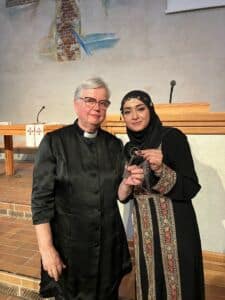
Anna Karin Hammar and Hiba Qatanani
“Remembering is an act of resistance.”
These words are from Bernt Hermele’s new book Nakba: Catastrophe Before Our Eyes. What we embody here tonight in the Mission Church in Uppsala is an act of resistance. What are we resisting? I will try to develop my understanding of this as a European Christian and priest.
For me, it started in the seventies when my father returned home from a trip to the Holy Land. He was so upset because he felt that the Palestinians had been given the worst land. With the gaze of a farmer he examined their terrain and was outraged, as the priest he was, in the face of a gigantic injustice. Thus began my commitment to the Palestinian cause. Eventually, in February 1988, as director of the World Council of Churches, I visited the Holy Land for the first time. With me was Lindiwe Myeza, black South African, from Soweto. Through her eyes, as well as those of the Chair of the YWCA, Palestinian Doris Salah, I was for the first time made aware of all the destroyed villages. I heard about what we now call ethnic cleansing, about the massacre in Deir Yassin on 9 April 1948 when almost a hundred people were murdered by the Zionist gangs Irgun and Stern. Word of these horrors spread rapidly throughout Palestine.
This memory is alive. Just a week ago, Josef Aranki from St. Mary’s parish in Stenhagen shared with me that his mother told him this was the reason why she fled Bir Zeit with her children. Some of the children could walk by themselves; she held a smaller child in one hand and a food basket in the other. But what about six-month-old Joseph? His mother, using her strong teeth, managed to carry him in tightly wrapped fabric. This memory, as it has been told to him, is an ongoing trauma for Joseph who himself is too overcome by emotion to participate here, but he wants you to know that he asked me to please share this story on his behalf.
Remembering what is difficult is painful. But it is a necessary act of resistance at a time when the Zionist project continues in its attempts to wipe out Palestinian history. From the point of view of the Palestinians, it is clear that this is a colonization and ethnic oppression of the Palestinian people. Palestinian land is still being conquered and Palestinian people are being driven from house and home.
In Sweden, the media often portray the conflict between Israelis and Palestinians as if it were a feud between equals, which is not the case. So we must change that narrative and bear witness to the harsh reality of the Palestinians’ story of colonization and expulsion, land conquest, denial of the right to self-determination, and lack of basic human rights.
I myself have been involved in Palestine for more than forty years. My experience of these forty years is that Israel has relentlessly conquered more and more Palestinian territory and living space. I have come to the firm belief that we do not understand the situation if we do not perceive it as a colonization project. That what is going on is to conquer someone else’s space so as to establish oneself in its place. And I think it is, as Al Haq writes, a colonization project, a settler project, sustained by apartheid as a means. (ref. https://www.alhaq.org/publications/20940.html)
But as a Christian priest what am I to do with the Jewish history and memory of what happened to Jews, as well as to Roma, disabled people, homosexuals and left-wing politicians, during the Holocaust and the Nazi terror of 1933-1945? We must not forget this either. And so I carry a prayer in my heart that one day the world will take the suffering of both Jews and Palestinians equally seriously. Only then will a political reality that gives everyone access to the whole Holy Land, with respect for each other’s suffering and in fundamental recognition of everyone’s rights, be able to take shape. International law is a blunt tool, but it is the only tool we have to navigate the worst threats to the respect for our common human dignity.
But in order to reach that future, we must do our utmost in the coming years to bring the Palestinian story to life. And we do that by remembering. By remembering and telling. The Nakba is therefore not only the disaster, which is still ongoing.
The Nakba is also the beginning of the resistance.
Long live Palestine!
Anna Karin Hammar
Priest and Theologian, Chair of Kairos Palestine Sweden